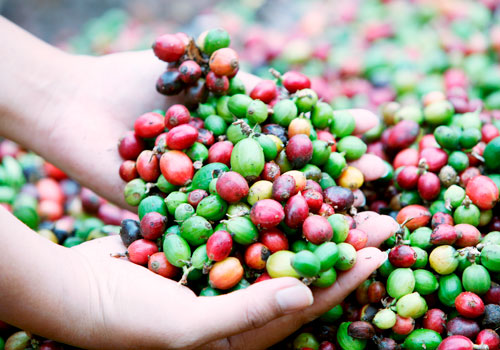Although coffee can be one big export product in the future, the industry needs support from the government to produce crops and protect local growers before competing in the international market (U Ye Myint, Chair of Myanmar Coffee Association)
3 สิงหาคม 2560
Coffee could be the next big export product for Myanmar. But the industry needs support and protection from the government to produce the crop and before local growers start competing in the international market, Myanmar Coffee Association chair U Ye Myint, told The Myanmar Times.
Myanmar is one of the few countries to cultivate and harvest high-grade coffee beans. Over the last few years, the country has exported growing quantities of coffee beans and now has a reputation for producing high quality coffee.
In 2015-16, Myanmar exported a total of 1,137 tons of coffee beans, more than double what it exported in 2011-12, according to data revealed by the Department of Trade.
Myanmar coffee is now exported to the US, Europe, Japan, South Korea, Thailand, China and Taiwan. Although Hawaii grows its own coffee, the US is still a net importer of coffee, and Myanmar has been an important market for the country. This year, new markets for Myanmar coffee in the UK, Australia and Iceland have also emerged.
“Now, we have quite a lot of coffee markets. So we need to be thread wisely as competition in the market is strong. We need develop coffee into a vital export crop but also produce coffee systematically and according to market demand. Also, it cannot be done by only private companies; we need the government to participate in schemes such as public-private partnerships,” U Ye Myint said.
Rising demand
Coffee is the second most important commodity after oil in the international commodity market, said Myanmar vice president U Henry Van Thio at a Coffee Forum held in Nay Pyi Taw in May. He added that coffee is one of the high-value crops among Myanmar agricultural products and thus can fetch more foreign currency, helping to narrow the country’s trade deficit.
In addition, the international market for coffee is much bigger than rice, Myanmar’s largest export. Much of the demand will come from the US. “Consumption in the US is high, and there is currently no protection for Hawaii coffee farmers with regards to the export and import of coffee. Therefore, the US can potentially be a lucrative coffee market for Myanmar,” said U Ye Myint.
Out of the ten 20-foot containers worth of coffee exported in 2016-17, two 20-foot containers carrying a total 2,000 tons of coffee was shipped to the US, according to the Myanmar Coffee Association.
“We participated in the US coffee exhibition for two years straight and received good feedback and interest in Myanmar coffee. So, we must capitalise on that demand,” said U Ye Myint.
Currently, the Ministry of Agriculture, Livestock and Irrigation expects to produce coffee on 200,000 acres of coffee plantation land between 2018 and 2020. It hopes to produce up to 60,000 tons by 2030. This year, domestic coffee production will reach about 2,000 tons on average, according to the Myanmar Coffee Association.
Government protection
However, coffee traders say the government needs to resolve existing farmland problems before cultivating the land as some people have trespassed on coffee plantations and destroyed coffee trees in the past. So, the law must protect farmers and prevent trespassing.
Coffee is mainly grown in Shan State, Mandalay Region, Kayin State and Chin State. In Shan State, coffee plantations have experienced their farmlands being destroyed and so the State should enforce laws to protect the plantation land, other coffee farmers said.
Meanwhile, other laws setting quotas on coffee imports should also be implemented to protect the industry, some businesses said.
If the coffee sector continues to improve, Myanmar could even see a rise in the number of boutique coffee shops and coffee chains. That will not only create jobs but raise income from tourism to the benefit of the economy, the businesses said.
For the Myanmar coffee industry to flourish, the government must make more effort to support and protect local farmers and businesses not just at the Union level but also at the regional level,” they said.
(The Myanmar Times: http://www.mmtimes.com/index.php/business/27047-as-demand-rises-local-coffee-could-emerge-as-key-national-export.html )











